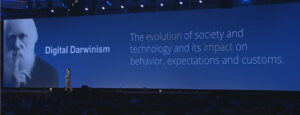Learning to do things differently will have a positive impact on your business.
Recently, I had the chance to talk with Deep Patel for Entrepreneur to discuss the challenges and opportunities surrounding digital Darwinism. In the conversation, I shared some of my work and observations about how living in an era of great disruption will ultimately humanize business (at least I hope).
Following is a summary of our conversation and five prescriptions for surviving and thriving an era of digital Darwinism…
1. Reimagine yourself in an era of digital Darwinism.
Our world has undergone a radical digital transformation, and most of those changes stem from investments to technology to modernize business infrastructure.
While all this new technology has enabled important changes to take place, these digital transformations often lack a broader context. Businesses must be thoughtful about how they are using this technology. We must reimagine what the customer experience could be, based on how technology is changing.
One area of my research focuses on digital transformation as people and technology that change from the inside out and the outside in. “t’s about having new perspectives and processes and systems that deliver new value to customers and employees in an era of digital Darwinism.
Ultimately, all these changes will allow businesses and brands to become more relevant during every step of the customer-employee experience.
2. Cultivate meaningful experiences.
Looking out onto the horizon, there’s unprecedented opportunities to change how companies interact with their customers.
The most important thing a brand can do to set itself apart from others is to give customers positive and powerful experiences. Oftentimes brands are too focused on transactions, messaging and marketing, without looking at what kind of experience customers are having with them. That’s a big mistake.
If consumers are deeply connected to a company, and associate positive and empowering experiences with a brand, they will be more likely to share their experiences with others and more inclined to do repeat business.
The reason why experience is such a big deal is that it introduces opportunities for companies to be incredibly innovative on the experiential front.
Some of my favorite brands are Disney, Disney Parks, Apple and Tesla, companies that thoughtfully craft their customers’ experience. They are incredibly experiential and innovative. Every one of them thinks about ‘my’ user experience, meticulously and relentlessly. And they make it easy for me to do business with them, so that I want to continue to do business with them.
3. Cater to the accidental narcissists.
Sometimes I create monikers to help us relate to changes in our environments. In this case, I believe we are becoming a generation of accidental narcissists living in a selfish economy.
Every app, every service and every network is teaching us that we’re the center of the universe. If you want a car, there’s an app for that. If you want validation, here’s a social network for that. We’re being positioned to become accidental narcissists.
This is especially true for millennials and Gen Z. These younger generation members live in a world where everything, from entertainment to social media and advertising, is personalized.
A selfish economy may sound negative, but I have a more optimistic view. We have an opportunity to serve a generation of self-focused consumers, which can drive technology to be more human and force brands to be more empathetic. A selfish economy gives companies insight into what people expect and how people behave, how people communicate and share, what they find interesting.
This combination of factors should inspire businesses to build genuine relationships. Ultimately, this means that businesses must create stellar experiences in order to create lasting relationships with consumers. I think people actually find that all this technology will make things a bit more human and engaging again.
4. Transform in the face of disruption.
On the horizon, we face creative upheaval. Customer expectations and behaviors are changing dramatically as a result of disruptive technology. This will force disruption and innovation at every level in every business.
We’re entering an era of rapid and dramatic innovation. So, the extent to which things like augmented and virtual reality are going to affect life — and as a result, affect behavior, and as a result, affect expectations — are only going to continue.
As a result, there will be tremendous breakthroughs in these areas and those breakthroughs will create a level of disruption that will force agility in many different business models.
5. Maneuver around roadblocks.
Of course companies face many past and future obstacles. And one of the biggest challenges is for them to think about and live their brands the way their customers do.
So often, when brands make investments in customer experience, they do it from a standpoint where they are disconnected, and they don’t feel natural. Company executives must alter their way of looking at competition. They aren’t just contending with known competitors, but also with unknown startups that will be their competitors tomorrow.
We live and have the ability to shape a new era of engagement, so we need to learn and unlearn how to do things differently. That requires a type of expertise that just doesn’t exist with new organizations today.
Connect with Brian!
Twitter: @briansolis
Facebook: TheBrianSolis
LinkedIn: BrianSolis
Youtube: BrianSolisTV
Snapchat: BrianSolis






Hi Brain, thanks for the tips! I’ve always hated that old cliché “its business, not personal”. I believe business is in fact very personal, it has an effect on everyone in the relationship (buyer, seller, employee) so, as the people behind the brands, we should stop thinking so much and start engaging more.